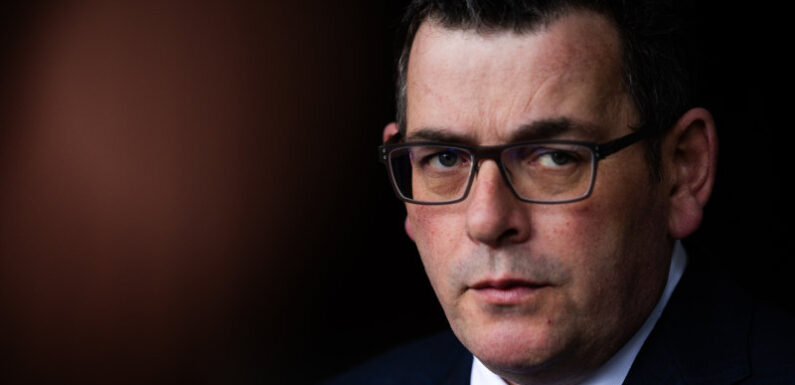
Save articles for later
Add articles to your saved list and come back to them any time.
Premier Daniel Andrews has sought to justify a possible tax on short-stay accommodation given providers like Airbnb have taken over a greater share of the rental market, as cabinet ministers prepare to finalise Victoria’s long-awaited housing statement.
After meeting on Monday, cabinet will reconvene for a special meeting on Tuesday afternoon to finalise the first phase of reform before its release in coming days, three ministers confirmed on condition of anonymity.
Premier Daniel Andrews is preparing to finalise the first phase of his government’s long-awaited housing reforms. Credit: Jason South
Andrews is to join Prime Minister Anthony Albanese at a Melbourne press conference on social housing, which will not involve the state’s housing statement, earlier on Tuesday.
The Age revealed last week that a proposal to introduce a statewide consumer-facing levy for short-stay accommodation would go to cabinet this week. Hotels are not expected to be included.
“There’s between 30,000 and 40,000 homes that are being Airbnbed or [put on] other platforms,” Andrews told ABC Radio Melbourne on Monday morning.
“They’re not available for someone to lease, to rent, on a longer-term basis. That’s a real thing.”
Andrews is facing a budget crisis, with Victoria’s net debt predicted to double from $116 billion this year to $234 billion in 2032-33 if the debt ratio remains stable, according to the state’s independent budget watchdog.
He is also facing a housing crisis. Infrastructure Victoria says Melbourne needs to build 44,000 new homes annually to accommodate an extra 3.1 million people by 2051, while rents for Melbourne homes rose for the seventh consecutive quarter by the end of June 2023, according to Domain. The median rental price for a house in Victoria’s capital was $520 in June and $500 for units – both record highs.
The short-stay industry has urged the state government not to introduce a levy north of 5 per cent, warning anything higher could hurt tourism given families are grappling with a cost-of-living crisis.
Airbnb’s head of public policy for Australia and New Zealand, Michael Crosby, said while the company supported a statewide levy, he was worried about an “uneven playing field”.
“A 7.5 per cent levy that applies only to short-term rental accommodation is too high, and would give hotels a free kick,” he said.
“We believe a levy somewhere between 3 to 5 per cent, which is in line with international policies, would be appropriate.”
Those comments were echoed by Eacham Curry, the head of government relations at fellow accommodation platform Stayz.
“Imposing a consumer-facing levy on short-term stays that could be as high as 7.5 per cent does not represent the best or most equitable way to address concerns around the impact of short-term accommodation,” he said, adding a levy could damage tourism.
But Labor for Housing, a group within the Labor Party that has successfully argued at state and federal conferences for stronger short-stay regulations, urged the Andrews government to push ahead with reform.
“When the greatest issue is supply, the disincentive has to be strong enough that we are getting these holiday properties back into the market so people have somewhere to live,”
co-convenor Juliana Todorovic said.
“The time for crowing about personal profits is over. It’s now time that everyone scrubbed in to fix the housing crisis.”
The Council to Homeless Persons welcomed the possible levy and said the proceeds must go towards public and community housing.
“The housing statement gives Victoria a once-in-a-generation chance to end homelessness, if done right. The state government must not let this chance slip through its fingers,” chief executive Deborah Di Natale said.
Katelyn Butterss, chief executive of the Victorian Public Tenants Association, said the focus needed to be on public rather than community housing.
Opposition Leader John Pesutto said the Coalition would oppose any tax on tourism, even if the short-stay levy were as little as 2 or 3 per cent.
“Victorians are already doing it tough,” he said. “What the Andrews government needs to do is stop wasting money. Stop doing things like torching $380 million on the cancellation of the Commonwealth Games, something it should never have committed to given there was no proper business case.
Michael Leaney, the chair of Peri Urban Councils Victoria and the deputy mayor of Baw Baw Shire Council, supported a levy but suggested a flat rate per night would be simpler.
Leaney, who is also a hotelier at the Walhalla Star Hotel, said a levy was unlikely to resolve the housing crisis in tourism destinations where short-stay accommodation was most lucrative.
Start the day with a summary of the day’s most important and interesting stories, analysis and insights. Sign up for our Morning Edition newsletter.
Most Viewed in Politics
From our partners
Source: Read Full Article
